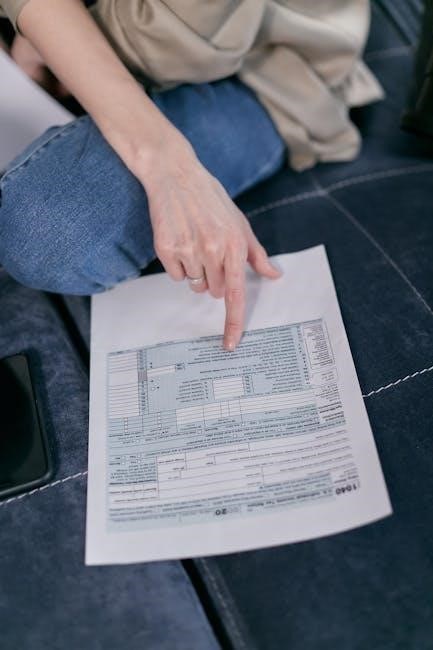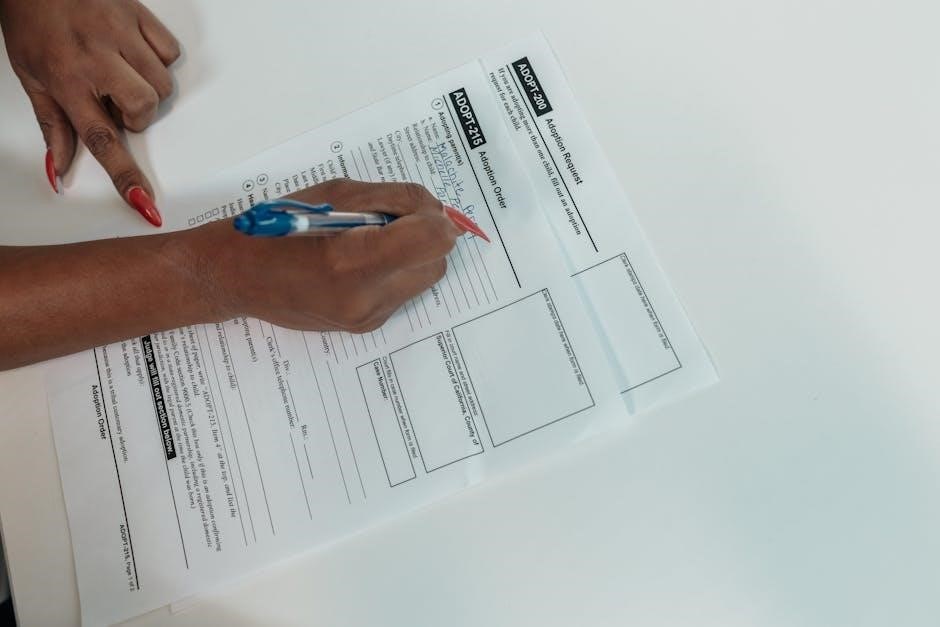Understanding the Hardship License Application Process in Illinois
Obtaining a hardship license in Illinois involves submitting a Restricted Driving Permit (RDP) application, proving financial or personal hardship, and meeting specific legal requirements. The process requires completing forms accurately and providing necessary documentation, such as car insurance proof and court documents. Professional evaluations and legal assistance may also be essential to ensure approval.
Definition of a Hardship License
A hardship license, also known as a Restricted Driving Permit (RDP), is a temporary driving privilege granted to individuals whose licenses have been revoked or suspended. It allows limited driving for essential purposes, such as commuting to work, attending school, or accessing medical care. This permit is designed to alleviate severe hardships caused by the loss of driving privileges while ensuring public safety. It is not a full reinstatement of a driver’s license but a conditional authorization to drive under specific restrictions.
Eligibility Criteria for a Hardship License in Illinois
To qualify for a hardship license in Illinois, applicants must demonstrate significant hardship, such as the inability to maintain employment, attend school, or access medical care without driving. A valid driver’s license at the time of suspension or revocation is typically required. Applicants must complete a professional alcohol/drug evaluation and may need to attend a hearing with the Secretary of State. Certain offenses, like multiple DUI convictions, may disqualify individuals. Each case is reviewed to ensure the permit aligns with public safety and the applicant’s urgent needs.
Required Documents for a Hardship License Application
Applicants must submit valid identification, proof of residency, current car insurance, court documents, and a professional alcohol/drug evaluation. Additional fees may also be required.
Valid Identification and Proof of Residency
To apply for a hardship license in Illinois, you must provide valid identification and proof of residency. Acceptable forms of ID include a state-issued ID card or driver’s license. Proof of residency can be demonstrated through utility bills, lease agreements, or bank statements. These documents must clearly show your current address and name. Ensuring all identification and residency documents are up-to-date and accurate is crucial for a smooth application process.
Current Car Insurance Proof
Applicants must provide proof of current car insurance to support their hardship license application in Illinois. This typically includes an SR-22 form if your license was revoked due to a DUI or other serious offense. The insurance must meet Illinois’ minimum liability requirements and be issued by a licensed provider in the state. This documentation ensures financial responsibility and is a critical component of the application process. The Secretary of State will verify the insurance details before considering your request.
Court Documents Related to the Conviction
Court documents related to the conviction are essential for a hardship license application in Illinois. Applicants must submit any relevant court records, including case disposition details or sentencing orders. These documents help verify the circumstances leading to the license suspension or revocation; The Secretary of State reviews this information to assess eligibility and ensure compliance with legal requirements. Providing accurate and complete court documents is crucial for a successful application and demonstrates accountability for the offense.
Professional Alcohol/Drug Evaluation
A professional alcohol/drug evaluation is required for individuals seeking a hardship license in Illinois, especially after a DUI conviction. Conducted by a licensed professional, this assessment evaluates the applicant’s substance use and potential risk. The evaluation must include recommendations for treatment or education. Submission of this report is mandatory to demonstrate accountability and willingness to address underlying issues; It plays a critical role in the Secretary of State’s decision to grant driving privileges, ensuring public safety and applicant rehabilitation.

Application Forms and Steps
Applicants must obtain and complete Illinois hardship license forms accurately, ensuring all personal details and circumstances are thoroughly documented. Submission to the Secretary of State is required.
Obtaining the Correct Application Forms
To apply for a hardship license in Illinois, individuals must obtain the correct application forms from the Secretary of State’s office or their official website. These forms are free and readily available online. The primary form required is the Application for Restricted Driving Permit (Form D-62). Additionally, applicants may need to complete a Physician’s Certification or other supporting documents, depending on the circumstances. Ensuring the forms are up-to-date and accurately filled is crucial for a successful application. Visit the Illinois Secretary of State portal for the most current versions.
Completing the Application Forms Accurately
Accurate completion of the hardship license application forms is essential for approval. Applicants must fill in all required personal details, such as name, address, and driver’s license number, without errors. Clearly state the reason for requesting a hardship license, providing specific examples of how the license suspension has caused significant hardship. Ensure all sections are filled out legibly and truthfully, avoiding any omissions or inaccuracies. Review the forms thoroughly before submission to prevent delays or denial due to incomplete or incorrect information.
Submitting the Application to the Secretary of State
Once completed, the hardship license application must be submitted to the Illinois Secretary of State’s office. Applications can be mailed or delivered in person, depending on the specific requirements. Ensure all required documents, such as proof of insurance, court records, and professional evaluations, are included. Double-check that the application is fully completed and signed to avoid delays. The Secretary of State will review the submission to determine eligibility for a Restricted Driving Permit (RDP). Timely and accurate submission is crucial for a smooth process.

Fees Associated with the Application
Fees for a hardship license application in Illinois include a non-refundable application fee and potential additional costs for reinstatement of driving privileges after suspension or revocation.
Application Fees for a Hardship License
The application fee for a hardship license in Illinois is a non-refundable charge required to process the request. This fee must be submitted along with the completed application forms to the Secretary of State. The amount varies based on the type of hardship license sought. Payment methods accepted typically include money orders or checks made payable to the Secretary of State. It’s important to note that the fee is non-refundable, even if the application is denied. Additional fees may apply for reinstatement of full driving privileges after the hardship period ends.
Additional Fees for Reinstatement
In addition to the hardship license application fee, applicants may incur reinstatement fees to restore full driving privileges. These fees vary depending on the nature of the offense leading to the license suspension or revocation. Reinstatement fees are separate from the application costs and must be paid to the Illinois Secretary of State. Payment methods typically include money orders or checks. These fees are mandatory for drivers seeking to regain unrestricted driving rights after the hardship period. Failure to pay may delay full reinstatement of your license.
Decision Process and Timeline
The Secretary of State reviews each hardship license application, considering the applicant’s circumstances and driving history. Decisions can take several weeks, varying by case complexity.
Review of the Application by the Secretary of State
The Secretary of State thoroughly examines each hardship license application to assess eligibility, ensuring all documents are complete and criteria are met. The review involves evaluating the applicant’s driving history, the nature of the offense, and the demonstrated hardship. A hearing may be required, where an officer considers the circumstances and compliance with legal requirements. The decision is based on whether granting limited driving privileges aligns with public safety and the applicant’s needs.
Average Time to Receive a Decision
The processing time for a hardship license application in Illinois typically varies depending on the complexity of the case. Applications are reviewed by the Secretary of State, and a decision may take several weeks. Factors such as the completeness of the application and whether a hearing is required can influence the timeline. Once approved, the applicant receives the permit by mail, outlining any specific conditions. If denied, the applicant may need to address deficiencies or wait for eligibility to reapply.
Reasons for Denial of a Hardship License
A hardship license may be denied due to insufficient proof of hardship or an incomplete/inaccurate application, requiring additional documentation or clarification before reconsideration.
Insufficient Proof of Hardship
Applications are often denied due to insufficient proof of hardship, such as failing to demonstrate how the license suspension severely impacts daily life. Applicants must provide detailed evidence, like employment verification, school enrollment, or medical needs, to show the necessity of driving. Vague or unsupported claims of hardship are unlikely to be approved. The Illinois Secretary of State requires clear documentation to validate the hardship claim, ensuring the restriction is not merely an inconvenience but a significant life disruption.
Incomplete or Inaccurate Application
An application may be denied if it is incomplete or contains inaccuracies. Missing or falsified information, such as unverified personal details or omitted court documents, can lead to rejection. It is crucial to thoroughly review and complete all sections of the form, ensuring accuracy and completeness. Submitting incorrect or incomplete data not only delays the process but also increases the likelihood of denial. Applicants must be meticulous in providing truthful and comprehensive information to avoid such issues.

Restrictions on a Hardship License
A hardship license imposes strict driving restrictions, limiting use to essential activities like work, education, or medical needs. Violations can result in further penalties and loss of privileges.
Restricted Driving Permit (RDP) Limitations
A Restricted Driving Permit (RDP) in Illinois allows driving only for specific purposes, such as commuting to work, school, or medical appointments. The permit restricts driving to certain times and locations, as outlined in the approval. Offenders must demonstrate a clear need for the permit and may face penalties for non-compliance. The RDP is not a full reinstatement of driving privileges and requires adherence to all specified conditions to maintain its validity.
Specific Conditions for Employment or Education
Applicants must provide detailed proof of employment or educational needs to qualify for a hardship license. Documentation from employers verifying work schedules and job requirements is essential. Students must submit evidence of enrollment and class schedules. The permit may restrict driving to direct routes between home, work, or school, ensuring minimal disruption. These conditions are strictly enforced, and any deviation can result in permit revocation, emphasizing the importance of compliance to maintain driving privileges.
Legal Assistance and Support
Attorneys specializing in traffic law can provide guidance throughout the hardship license application process, ensuring compliance with Illinois regulations and improving chances of approval. Legal aid resources are available to assist applicants in navigating the complex requirements and documentation needed for a successful submission.
Role of Attorneys in the Application Process
Attorneys play a crucial role in guiding applicants through the hardship license process, ensuring all legal requirements are met. They review applications, prepare necessary documents, and represent clients during hearings. Legal expertise helps navigate complexities, increasing the likelihood of approval. Attorneys also provide strategic advice, addressing specific circumstances and ensuring compliance with Illinois regulations. Their involvement streamlines the process, reducing delays and potential denials. Professional legal support is often vital for securing driving privileges under hardship conditions.
Resources for Legal Aid in Illinois
Illinois offers several resources to assist with the hardship license application process. The Illinois Secretary of State’s office provides detailed guidelines and forms online. Legal aid organizations, such as the Illinois Legal Aid Online portal, offer free resources and referrals to low-income applicants. Additionally, local non-profit legal clinics provide guidance on navigating the application process. These resources ensure applicants have access to the support needed to complete and submit their applications effectively, improving their chances of approval.

Appealing a Denied Application
If your hardship license application is denied, you can appeal by revising and resubmitting your application with additional documentation or clarification to address the denial reasons.
Process for Reapplying After Denial
If your hardship license application is denied, you may reapply after addressing the specific reasons for denial. You must wait the required period, usually 30 days, before submitting a new application. Ensure all documentation is updated and complete, including proof of remedial actions taken since the denial.
Re-submit the application with corrected or additional information to the Secretary of State. Pay the necessary fees again and include any new evidence supporting your hardship claim. A professional evaluation or updated court documents may be required to strengthen your case.
Revising and Resubmitting the Application
After denial, carefully review and revise your application to address any inaccuracies or missing information. Ensure all forms are completed accurately and thoroughly, providing updated or additional documentation as required. Submit the revised application to the Secretary of State, including any new evidence supporting your hardship claim. Professional evaluations or legal advice may help strengthen your case. Ensure all fees are paid and requirements are met before resubmission.

Renewing a Hardship License
Renewal requires submitting updated forms, proof of continued need, and compliance with existing terms. Ensure all documents are current and meet the Secretary of State’s requirements.
Requirements for Renewal
To renew a hardship license, applicants must submit updated application forms and provide proof of continued hardship. Current car insurance, a valid ID, and any required professional evaluations must be included. The Secretary of State may request additional documentation to verify ongoing eligibility. Applicants must also remain compliant with all terms of the original hardship license. Failure to meet these requirements can result in denial of renewal. Ensure all fees are paid and submissions are made before the expiration date to maintain driving privileges without interruption.
Duration of the Hardship License
A hardship license in Illinois is typically granted for a specific period, often aligned with the terms of the original suspension or revocation. The duration is determined by the Secretary of State and may vary based on the severity of the offense and the applicant’s circumstances. Some licenses are issued for a fixed term, such as one year, while others may be granted until the driver meets specific conditions. The license remains valid only during this period, after which renewal or full reinstatement is required to continue driving legally.

Consequences of Violating the Terms
Violating a hardship license terms can lead to severe penalties, including license revocation, extended suspension periods, and additional fines. Non-compliance may also result in criminal charges and further restrictions on driving privileges, complicating future reinstatement efforts.
Penalties for Non-Compliance
Violating the terms of a hardship license can result in severe penalties, including fines, license revocation, and even jail time. Drivers may face additional suspension periods and increased reinstatement fees. Repeat offenses can lead to long-term loss of driving privileges and further legal consequences. Non-compliance underscores the importance of adhering strictly to the conditions set by the Illinois Secretary of State.
Impact on Future Driving Privileges
Violating the terms of a hardship license can severely impact future driving privileges. Multiple offenses may lead to prolonged suspension periods and increased reinstatement fees. A history of non-compliance can result in stricter restrictions or permanent loss of driving rights. This underscores the importance of adhering to the conditions of the hardship license to avoid long-term consequences on your ability to drive legally in Illinois.
Importance of Compliance
Adhering to the terms of a hardship license is crucial to avoid further penalties and ensure uninterrupted driving privileges. Compliance demonstrates responsibility and helps maintain eligibility for future reinstatement.
Maintaining the Terms of the Hardship License
Maintaining compliance with a hardship license requires adhering strictly to its conditions. This includes restricted driving hours, specific purposes like work or school, and avoiding any violations. Licensees must ensure their car insurance remains active and all court-ordered requirements are fulfilled. Failing to comply can result in revocation of the permit and extended loss of driving privileges. Regular check-ins with the Secretary of State may be necessary to confirm ongoing eligibility.
Consequences of Misuse
Misusing a hardship license can lead to severe penalties, including revocation of the permit, fines, and extended driving bans. Violations such as driving under the influence or operating outside permitted hours can result in jail time. Repeat offenses may cause permanent loss of driving privileges and additional legal consequences. Compliance with the terms is critical to avoid further complications and ensure continued access to restricted driving privileges.
Additional Resources
Visit the Illinois Secretary of State website for detailed application guides and contact information. Utilize online portals for submitting forms and accessing official resources efficiently.
Illinois Secretary of State Contact Information
The Illinois Secretary of State can be reached at their official website or by phone at 1-800-252-8980. For specific inquiries about hardship licenses, visit their office located at 213 State Capitol, Springfield, IL 62756. Additionally, their Driver Services Department provides detailed application guides and resources. Utilize their online portal for submitting forms or seeking assistance with the application process. This ensures a streamlined experience for obtaining a hardship license in Illinois.
Online Portals for Application Submission
The Illinois Secretary of State offers online portals for submitting hardship license applications. Visit their official website at https://www.ilsos.gov/ to access application forms and guidelines. The portal allows applicants to upload required documents, pay fees, and track the status of their application. Additional resources, such as instructional guides and checklists, are available to ensure compliance with submission requirements. Utilizing the online portal streamlines the process, saving time and reducing the risk of delays. It is the most convenient method for submitting a hardship license application in Illinois.